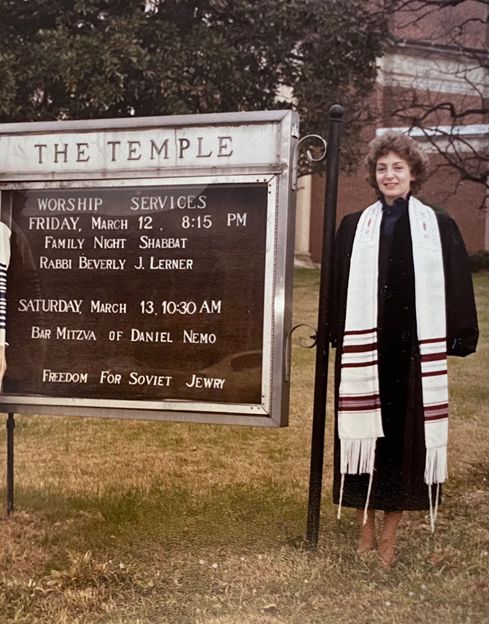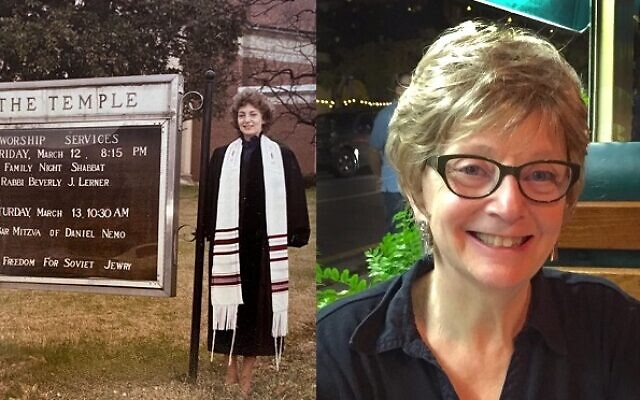Atlanta’s First Female Rabbi Looks Back
Forty-two years have passed since The Temple made history by hiring Rabbi Devon Lerner.
Dave Schechter is a veteran journalist whose career includes writing and producing reports from Israel and elsewhere in the Middle East.
More than four decades have passed since Rabbi Devon Lerner (whose first name then was Beverly) delivered her first sermon at The Temple.
She remembers there being a large crowd that Friday night, on July 13, 1979. “I have very fond memories of my experience there,” Lerner said. She served as assistant rabbi at The Temple for two years, until leaving to lead a Reform congregation in Richmond, Va.
She is believed to have been Atlanta’s first female rabbi.
Reform Judaism in America began ordaining women in 1972, followed in 1974 by the Reconstructionist movement and by Conservative Judaism in 1985. The major bodies within Orthodox Judaism remain opposed to ordaining women.

The Temple was Lerner’s first pulpit after her ordination in June 1979 at Hebrew Union College in Cincinnati, a seminary for Reform rabbis. The reception to her appointment was “mixed in the beginning, which has been a pattern that continued with other women who were the first” in their pulpits, she said.
“There was a lot of curiosity about me,” along with “a lot of support within the congregation, clearly within the board,” Lerner said. “The Temple has a long history of being on the edge of social justice issues. This particular issue was an important one. They wanted to have a woman rabbi.”
If there was one area in which Lerner ruffled feathers within the congregation, she said, it was over language in the prayer books. At the time, the Reform movement used “Gates of Prayer: The New Union Prayer Book,” which had been introduced in 1975 as a replacement for the “Union Prayer Book” used for the previous 80 years.
“The sexist language in the liturgy was a problem for me,” Lerner said. “I felt it should be gender neutral, or at a minimum interchange male references to God with female.” On the pulpit, “I would change the pronouns. I wouldn’t use ‘king’ either, because that has the same problem. I would put other words, such as ‘eternal one.’ That got some pushback.” That included being called before the liturgy committee to explain herself.
“I cannot relate to a God with language that identities God as ‘He.’ It doesn’t include me as a woman. In all good conscience, I can’t feel honest and do that,” she recalled telling the committee.
In the end, “It just got accepted,” but she was alone in using gender neutral language from The Temple’s pulpit.
Today’s Reform movement prayer book, “Mishkan T’filah,” introduced in 2007, replaced masculine references to God and mentions of the patriarchs are paired with the matriarchs.
Lerner said that during her two years at The Temple, “Alvin Sugarman gave me quite a bit of freedom to do what I wanted. He asked what I was most interested in.” Sugarman, then The Temple’s senior rabbi, is now rabbi emeritus.
Lerner’s interests included social justice issues, particularly relations between the Jewish and African-American communities. In that capacity, she engaged with The Martin Luther King, Jr. Center for Nonviolent Social Change, which was established in 1968 by Coretta Scott King, widow of the slain civil rights leader.
“Black-Jewish relations were particularly present and forefront,” Lerner said. She noted that her tenure coincided with the case of Atlanta’s missing-and-murdered children. Between July 1979 and May 1981, at least 29 Black children, adolescents and young adults were killed, most by strangulation or asphyxiation.
At the time, Sugarman urged congregants at The Temple “to participate in the reward fund and talk to their friends in the Black community to let them know that they did care and we are one community.”
Lerner remembered, “The religious communities were very upset about this and felt that we needed to do something because of a feeling that no one was doing anything about it.”
“I was part of an organizing committee to put together a march down the streets of Atlanta in protest, to support the Black community, and raise the awareness levels of the tension that wasn’t being handled well at all in the city,” she said. That protest, on March 15, 1981 — when the death toll had reached 20 — proceeded through downtown to The King Center.
Lerner left Atlanta to become rabbi of Congregation Or Ami, in Richmond, which she served until 1984. For the past decade she has been program director of Roots of Reform Judaism.
Although she has relatively little contact today with Atlanta, “I hold people there dear in my heart,” Lerner said.
- Community
- Synagogue Guide
- Dave Schechter
- The Temple
- Rabbi Alvin Sugarman
- Rabbi Devon Lerner
- Female Rabbi
- Atlanta
- hebrew union college
- Social Justice
- Gender Nuetral
- Gates of Prayer: The New Union Prayer Book
- Union Prayer Book
- Mishkan T’filah
- jewish community
- African-American Community
- The Martin Luther King Jr. Center for Nonviolent Social Change
- Coretta Scott King
- Martin Luther King Jr.
- The King Center
- Roots of Reform Judaism
- Congregation Or-Ami
- The Lost Children




comments